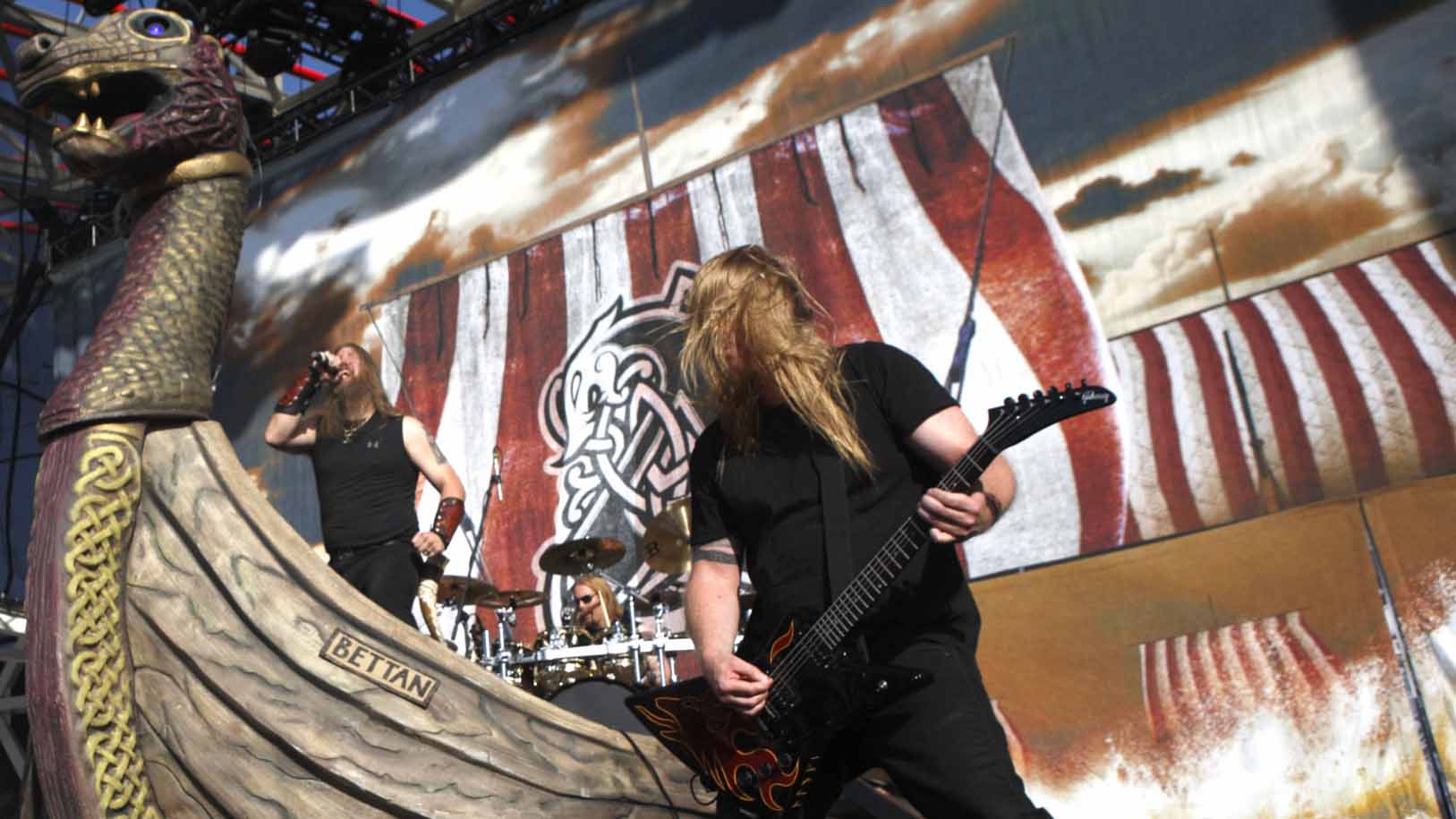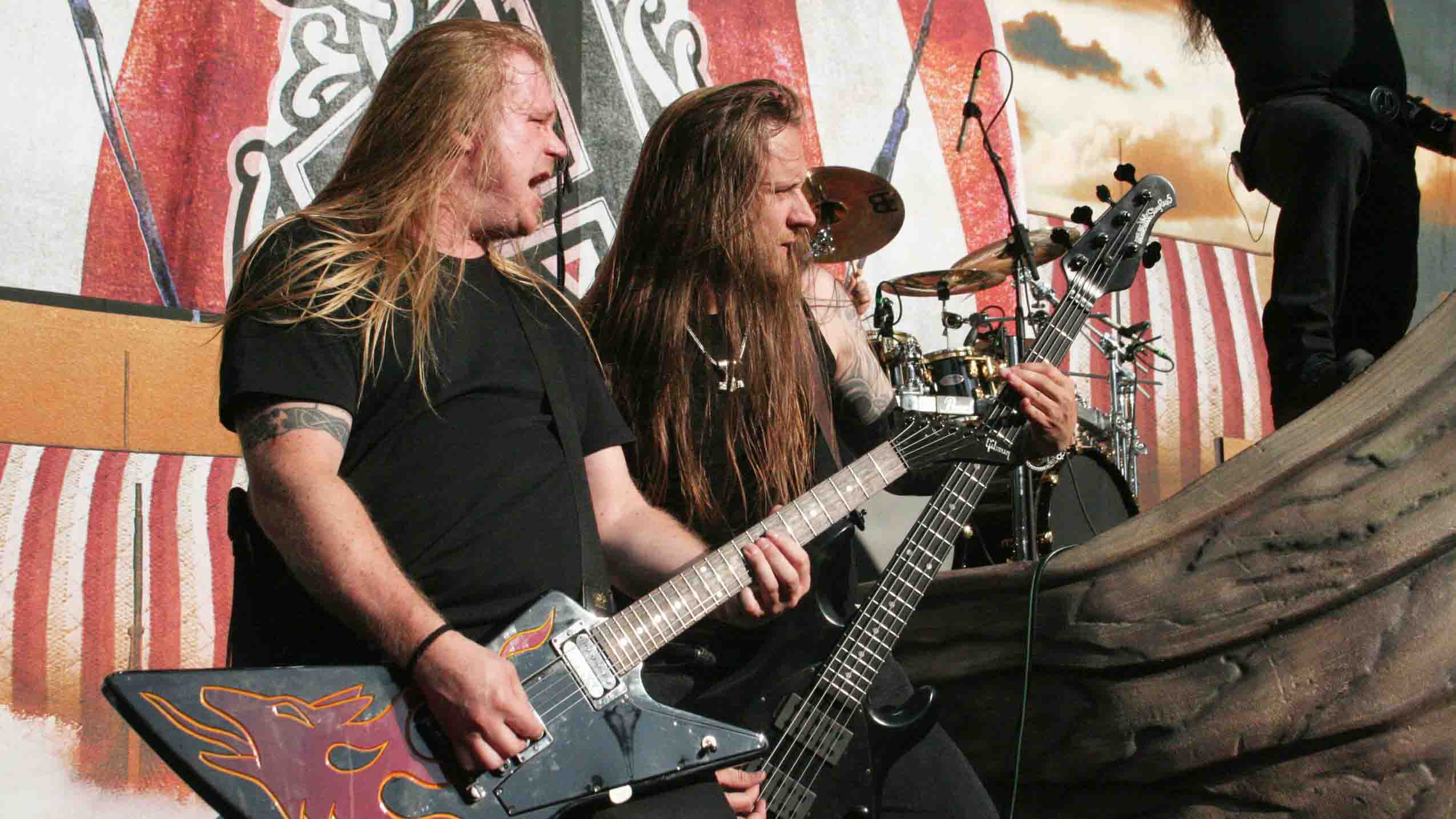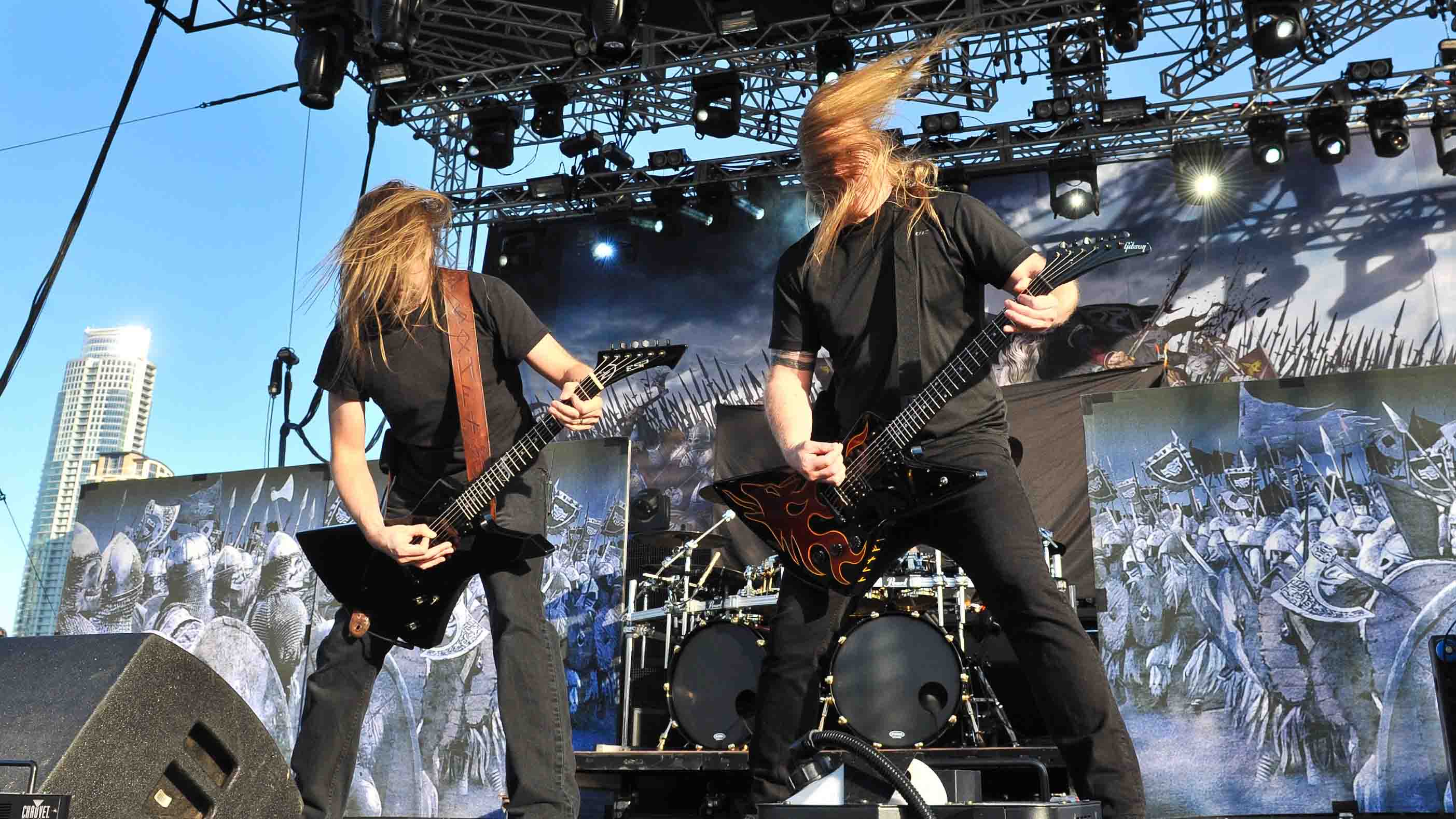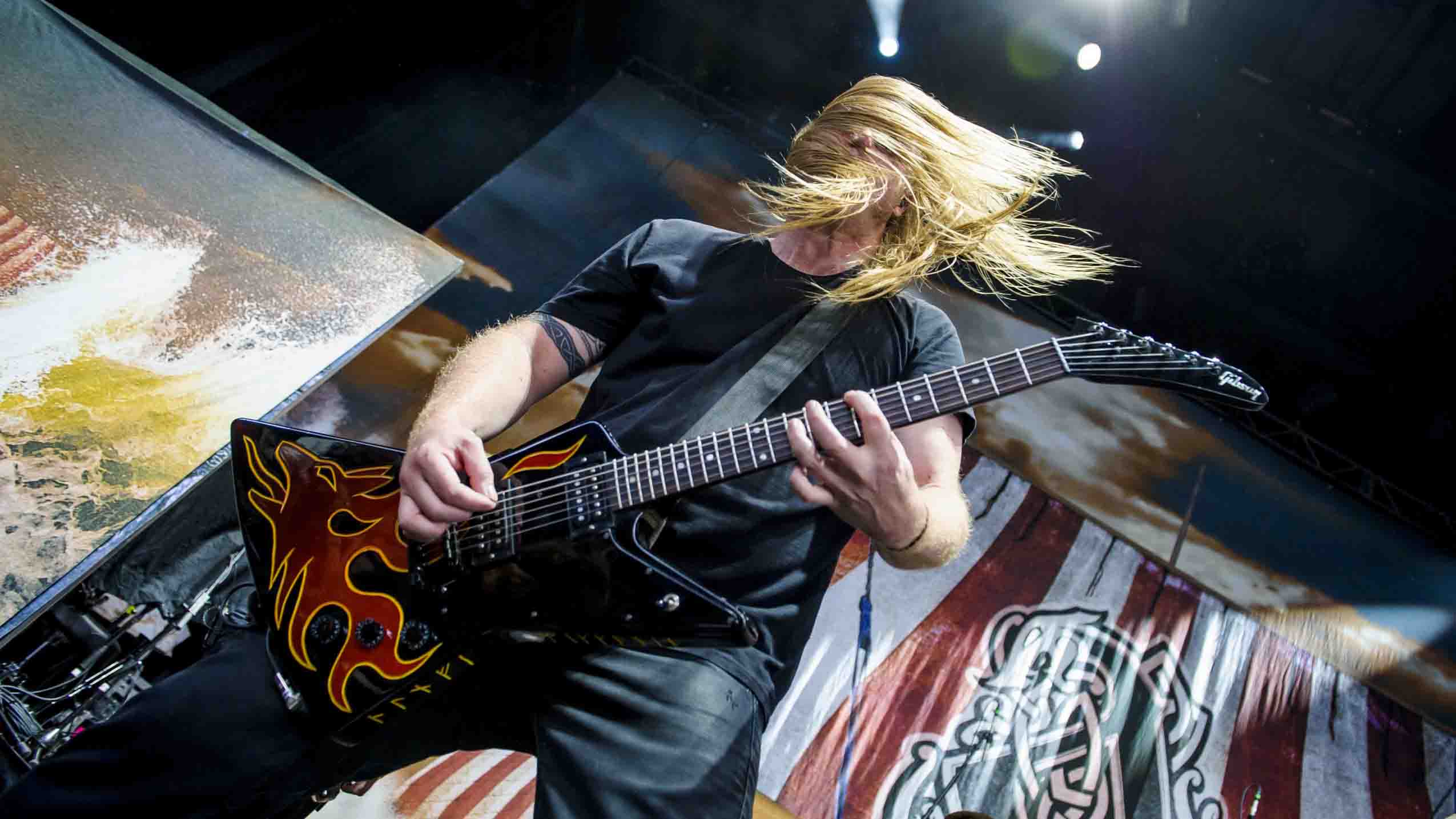Amon Amarth's Olavi Mikkonen talks Jomsviking, Explorers and Viking metal
Melodic death metal guitarist dishes the dirt on album 10

Introduction: Jomsviking
It’s very apt indeed that Amon Amarth’s 10th studio album Jomsviking – made not long after frontman Johan Hegg’s movie debut in Northmen: A Viking Saga – is their most cinematic offering yet. The Swedish melodeath masters have raided the history books and delved deep into Norse mythology over the years, but never in one singular narrative running the course of an entire album…
“This album feels like a movie to us,” says guitarist Olavi Mikkonen, who shares six-string duties with co-guitarist Johan Söderberg.
“It’s the same story throughout the album. Johan wrote down a script and that’s what we based the whole album on. Basically, the Jomsviking were the mercenaries of the Viking era. Though it’s a fiction story that we came up with ourselves, the Jomsviking were around… there’s truth to their existence.
“There’s a young man that kills important people in the village he lives in and has to flee for his life. He accidentally joins the Jomsviking and becomes this badass warrior. Eventually, after many, many years, he comes back to his homeland. See what I mean: it’s basically like a movie!”
If you’re wondering how much of an impact their frontman’s involvement in the film business had on the fruits of their labour, the answer is probably a fair bit… It’s the perfect soundtrack to conquering the world, which is something you could say the Swedes have been doing since their formation in 1992.
“Yes, I think the film must have had an effect,” ponders the guitarist, “because Johan did that movie straight after we finished recording our last album Deceiver Of The Gods, in between touring it. So, as we began talking about the follow-up record, he was already thinking in movie terms. And we figured let’s do a movie, but skip the picture bit and just do the music. That’s how the idea was born… so, in a way, if Johan didn’t do that movie, maybe we might have written a regular album.”
That said, even a “regular album” from Amon Amarth will have more storytelling than a night in with Stephen King. This is a band that know what works for them and when to stick to it.
“In a sense, we do stick to Viking mythology,” continues Mikkonen. “If that’s a concept, then yes, we are a concept band. I don’t see us ever writing lyrics about other topics, like Peter Pan or whatever; that would be kinda awkward. You should never say never, but I can’t see us straying too far away from what we’ve been doing.”

Norse code
It’s easy to see why the term ‘Viking metal’ has remained applicable in Amon Amarth’s case. Though Bathory and Enslaved may have typified the genre sonically in the stricter sense, Mikkonen and his bandmates play a type of metal that only pays tribute to the great marauders of the north.
It’s a label their frontman has repeatedly played down over the years, but Mikkonen would be the first to admit he doesn’t actually agree with his bandmate on this one…
“That is something Johan said a few years ago, and everyone thinks it’s the opinion of the whole band,” laughs the guitarist. “But I don’t agree with Johan: Viking metal makes sense. All our lyrics and imagery are Viking, and we play metal, so we’re Viking metal. I don’t get why that doesn’t make sense to him, ha ha! Though we do not play folk-inspired Viking music, in the more traditional sense. There’s definitely none of that in Amon Amarth!”

Sneap picking
As for the guitar sounds heard on Jomsviking, both Amon Amarth guitarists were happy to leave their tones with the capable hands of super-producer Andy Sneap, who was first brought in for 2013’s Deceiver Of The Gods.
While many guitarists would naturally feel reluctant leaving their sound in the hands of anyone but themselves, Mikkonen knew if anyone could help him capture the sound in his head – and who knows, maybe even something better – it would be Derby’s very own master of mixing…
“When you record with Andy Sneap, you don’t even get involved with the guitar tones! He’s the expert, so why even bother?! We’d just tell him roughly what kind of sound we were looking for and he would fix it for us.
“With the Deceiver album, we were really happy with our sound, and this time round, we wanted something a little heavier and chuggier. He’s amazing when it comes to sound; you just can’t argue with Andy!
When you record with Andy Sneap, you don’t even get involved with the guitar tones!
“He profiled all the tones on our Kempers… we went for an EVH sound, maybe mixed with a bit of Peavey. And now that will be the tone we’ll keep on them for the whole cycle. They are so convenient, so easy… every day, it’s exactly the same sound.
“Since we all have in-ears, there’s nothing on stage, so it’s easy for the crew to get that perfect sound for us. That’s why I love the Kemper Profilers!”
For much of his career, Mikkonen has pillaged with an Explorer in his hands, and openly admits that’s unlikely to ever change. But a new model from Gibson ended up being one of the main instruments used for tracking Jomsviking – it was a most welcome addition to the band’s sonic arsenal, because what could be more metal than black?
“I got one of the new Gibson Blackouts,” grins Mikkonen. “It’s an amazing guitar and actually quite rare – it wasn’t easy getting one. It’s basically a standard Explorer, but everything is black and it comes with different humbucker pickups made by Gibson [Dirty Fingers]. There’s also a different profile on the neck; it’s more of a slim taper compared to the regular Explorer. It’s mainly a design thing: I think they look so cool because they’re totally black!”

Major league
The new album also marks the band’s debut major label release, at least for Europe, where Sony will be working the album instead of Metal Blade, though the independent will continue to represent them across the pond.
For Mikkonen and his bandmates, it’s almost like the best of both worlds, with the financial muscle of a world-renowned music company working alongside the label that helped grow them into what they are today.
“Metal Blade have been doing an amazing job,” notes the guitarist. “We love them, and we’re still signed to them in the US. But we were looking for a change in Europe; there could be stuff we were missing out on and this felt like the solution.
People might think, ‘Oh, they’re signing to a major, so they’re going to change their sound…' But that’s bullshit
“It was actually Metal Blade that pushed us to this decision; there are no bad feelings or anything like that. Hopefully, Sony can help us reach out to places we haven’t managed to yet. I’m not gonna lie, there’s more financial potential behind it that hopefully can gain the band…
“But we’re not gonna change anything. People might think, ‘Oh, they’re signing to a major, so they’re going to change their sound as the label demands it!’ But that’s bullshit. No one’s gonna have input in our music but us.
“I’m feeling very positive about Sony; obviously, the record isn’t out yet, but so far they’ve been amazing and doing a good job. It might be a major label, but all the people taking care of us are all metalheads who have been doing it for 20 years, maybe not under Sony. I think some people came from Roadrunner and that kind of camp. So it’s metal people taking care of metal bands.”

Row, row, row your boat…
Those less versed in the dark art of death metal may be surprised to find that – despite containing lyrics often violent enough to get a person sectioned – its listeners are not oblivious to the endless avenues of dark humour to be explored within.
Picture this: Amon Amarth are in the middle of their set on the main stage at Bloodstock 2009, and the fans gathered before them sit down and start rowing in time with the music. Or not, depending on how much 8% cider had been consumed…
“That was fucking awesome – it’s definitely not a common thing for bands,” laughs Mikkonen. “It’s like Dio starting the whole raise your horns thing; we’re the same for rowing. It’s unique!
“It’s happened quite a few times now, especially on the festival circuit, but it started at Bloodstock. I guess people saw it on the internet, and now we’ve had it at Wacken, Rock Am Ring/Rock Im Park, even club shows… it’s been spreading thanks to the UK maniacs!”
It’s like Dio starting the whole raise your horns thing; we’re the same for rowing
Perhaps it’s because there’s real sense of celebration to the music – possibly even a ring of truth to their tales of victory on the battlefield, judging from the legions of metalheads pledging allegiance the world over?
“On one hand, heroic music needs heroic stories, but we always wanted this band to be fun,” says Mikkonen. “We want the good feeling from us to pass onto to the audience when they see the show.
“I still look up to the same bands I did when I was a kid – I’ll shake like a little boy anytime we’re playing on the same bill as Iron Maiden! But hey, that’s life. We’ve had a lot of luck and some good people like [Metal Blade founder] Brian Slagel behind us… but there’s been a lot of work to it.
“It’s not like we got famous on our first album; it’s been step by step and taken 20 years to get us to where we are today. Never step down and take it easy, always push harder!”
Jomsviking is released on 25 March.
Amit has been writing for titles like Total Guitar, MusicRadar and Guitar World for over a decade and counts Richie Kotzen, Guthrie Govan and Jeff Beck among his primary influences. He's interviewed everyone from Ozzy Osbourne and Lemmy to Slash and Jimmy Page, and once even traded solos with a member of Slayer on a track released internationally. As a session guitarist, he's played alongside members of Judas Priest and Uriah Heep in London ensemble Metalworks, as well as handling lead guitars for legends like Glen Matlock (Sex Pistols, The Faces) and Stu Hamm (Steve Vai, Joe Satriani, G3).
